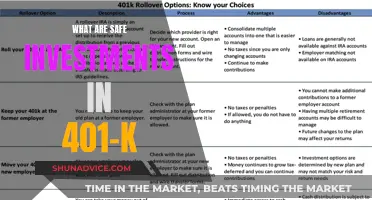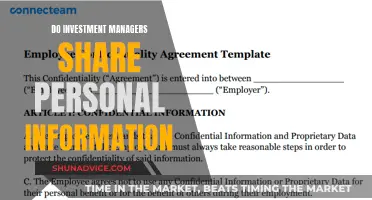
Investing is one of the best ways to generate wealth, but it requires discipline and consistency. While there are many ways to profit from the stock market, it's important to remember that with great potential reward comes great risk. Therefore, it is crucial to invest wisely and avoid making emotional decisions based on the fear-and-greed cycle. Here are some key principles to help you get started on your journey to becoming rich through investing:
- Start early and stay in the market: Compounding interest works in your favour the earlier you begin investing. The power of compounding allows your investments to earn interest over time, and the longer you stay invested, the more compound growth you can achieve.
- Invest consistently: Instead of investing a lump sum, consider investing a certain amount regularly. This approach helps you build wealth faster and maximize the benefits of compounding.
- Diversify your investments: Don't put all your eggs in one basket. Diversification helps reduce risk and minimize losses. Consider investing in multiple stocks across different industries, as well as bonds and index funds.
- Avoid unnecessary spending and debt: Control your spending impulses and avoid high-interest debt. Every dollar saved and invested is a dollar working towards your goal of becoming rich.
- Get professional help: Consider working with a financial advisor or using a robo-advisor. They can provide valuable guidance, create a financial plan tailored to your goals, and help you make informed investment decisions.
| Characteristics | Values |
|---|---|
| Start early | The earlier you start, the more you can benefit from compounding |
| Stay in the market | The longer you stay in the market, the more compound growth you can earn |
| Invest consistently | The fastest way to build wealth is to invest a certain amount regularly |
| Diversify your investments | Diversification can help reduce risk and prevent huge losses in the market |
| Avoid unnecessary spending and debt | Limit spending so that you can put more money to work for you |
| Save 15% of your income | Save at least 15% of your annual gross income for your retirement |
| Avoid lifestyle inflation | Resist the urge to spend more as you make more money |
| Get help from a financial advisor | A financial advisor can help create a financial plan and manage your assets to maximise your return |
What You'll Learn

Start saving early
Starting to save early is one of the most important steps to building wealth. The earlier you start, the more you can benefit from compounding.
Compounding allows your money to earn interest, and that interest also earns interest. The longer you leave your money, the more it grows. For example, if you invest $1,000 at 10% yearly compound interest, you will have earned $100 at the end of the first year. In the second year, both the original $1,000 and the $100 interest will earn compound interest. This process continues, and your money grows more and more each year.
To illustrate the power of compounding, consider two investors: James and Jane. James starts investing at the beginning of 2020, and Jane begins in 2022. They both invest $1,000 at 10% compound interest, but at the end of 2023, James has $1,464, while Jane has $1,210. That's a $254 difference, and it will continue to grow as time goes on. By the end of 2029, James will have $2,594, and Jane will have $2,144, a difference of $450.
The key to building wealth is to start as early as possible and stay disciplined. Making your first million won't be easy, but it's not impossible. Start saving early, stay in the market through highs and lows, invest monthly, and diversify your investments.
Understanding Managed Portfolio Investment Strategies and Benefits
You may want to see also

Avoid unnecessary spending and debt
One of the key steps to building wealth is to avoid unnecessary spending and debt. Here are some tips to achieve this:
- Stop buying things you don't need: Before making a purchase, ask yourself: "Do I really need this?", "Am I trying to impress others?", "Do I already have something similar?" and "Do I want this more than I want to become a millionaire?". Every dollar spent on something unnecessary is a dollar less that could be making you money.
- Reality check: If you save and invest an extra $25 a week for 40 years, assuming a 7% annual return and monthly compounding, you will end up with $263,000. Cutting down on unnecessary spending can make a significant difference in achieving your financial goals.
- Create a savings plan: Review your monthly debts, income, and financial goals, and set up a direct deposit for a small amount from your paycheck to a savings account. If you don't see the money in your checking account, you're less likely to spend it.
- Avoid high-interest credit card purchases: Using a high-interest credit card for purchases can lead to accumulating debt and hinder your ability to save and invest.
- Resist lifestyle inflation: As your career advances and your income increases, resist the urge to increase your spending. Instead of spending more, focus on saving and investing more to reach your financial milestones faster.
- Work with a financial advisor: Planning for retirement and investing can be complex and stressful. Consider working with a qualified financial advisor to create a personalized retirement plan and investment strategy that aligns with your goals.
By following these steps and making conscious choices about your spending, you can avoid unnecessary expenses and debt, enabling you to allocate more funds towards your investments and accelerate your journey towards becoming a millionaire.
Investing: Is It Worth Paying 900 Every Quarter?
You may want to see also

Save 15% of your income
Saving 15% of your income is a great way to build wealth over time and is one of the key principles of successful investing. Here's how:
Start Early and Invest Consistently
The power of compound interest means that time is your best friend when it comes to investing. The earlier you start, the more time your money has to grow. For example, if you invest $1,000 at a 10% yearly compound interest rate, you will earn $100 at the end of the first year. In the second year, both the original $1,000 and the $100 interest will earn compound interest, and this process continues.
By starting early, you give your investments a longer runway to benefit from compound growth. For instance, consider two investors, James and Jane. James started investing at the beginning of 2020, while Jane began in 2022, both with $1,000 at a 10% compound interest rate. By the end of 2023, James would have $1,464, while Jane would have $1,210, a difference of $254. This advantage for James will persist and even expand going forward.
Therefore, it's essential to start saving and investing as early as possible. Automating your investments by setting up direct deposits or regular contributions to your investment accounts can help ensure consistency.
Diversify Your Investments
Diversification is a critical strategy to reduce risk and prevent significant losses. Instead of putting all your eggs in one basket, spread your investments across different assets, industries, and types of investments. For example, invest in multiple stocks in different sectors rather than just one or two in the same industry.
You can also diversify by investing in a mix of stocks, bonds, index funds, exchange-traded funds (ETFs), and real estate. Diversification ensures that a downturn in one particular investment or industry doesn't significantly impact your entire portfolio.
Take Advantage of Employer-Sponsored Retirement Plans
If your employer offers a 401(k) or similar retirement plan, take advantage of it. These plans often include tax advantages and easy payroll deductions, making them attractive investment vehicles. Additionally, many employers offer matching contributions up to a certain percentage of your salary, which is essentially free money added to your investments.
For example, if your employer matches contributions of up to 6% of your salary, you only need to save 9% to reach the recommended 15% savings rate. This employer match can significantly boost your retirement savings over time.
Avoid Unnecessary Spending and Lifestyle Inflation
Controlling your spending is crucial to saving 15% of your income. Ask yourself if you really need to make a purchase, or if you're spending money to impress others or for entertainment. Every dollar spent on non-essentials is a dollar that could be working for you and earning returns.
Resist the urge to increase your spending as your income grows. Instead, channel those additional funds into your investments. This discipline will help you stay on track and reach your financial goals faster.
Get Professional Help
Building wealth and investing can be complex, and it's okay to seek help. Consider working with a qualified financial advisor or planner who can provide personalized advice and create a financial plan tailored to your goals. They can help you choose the right investments, create a budget, and make plans to maximize your wealth.
Additionally, a good tax accountant can advise you on tax-efficient investment strategies and help you keep more of your money.
In summary, saving 15% of your income is a solid step towards building wealth. Start early, invest consistently, diversify your portfolio, take advantage of employer-sponsored retirement plans, control your spending, and don't be afraid to seek professional guidance. With discipline and a long-term focus, you'll be well on your way to achieving your financial goals.
Understanding Portfolio Investment: Strategies for Success
You may want to see also

Diversify your investments
Diversifying your investments is a crucial aspect of successful investing and building wealth. Here are some key insights on why and how to diversify your investments:
Diversification is a risk management strategy. By spreading your investments across various assets, industries, and sectors, you reduce the potential impact of losses in any one investment. In other words, don't put all your eggs in one basket. For example, if you invest all your money in stocks and the stock market takes a downturn, your portfolio will suffer significant losses. However, if you also invest in real estate and bonds, they can potentially offset the losses from the stock market downturn.
- Asset Allocation: Diversify across different asset classes such as stocks, bonds, real estate, and cash. Each asset class tends to behave differently in different market conditions. For example, when the stock market is down, bond prices often rise, reducing potential losses.
- Industry and Sector Allocation: Within the stock market, diversify across different industries and sectors. For instance, invest in technology, healthcare, finance, and so on. This way, if a particular industry or sector faces challenges, your portfolio won't be overly affected.
- Geographic Diversification: Consider investing in companies and assets from different countries and regions. This type of diversification can help reduce the impact of country-specific or regional economic downturns or geopolitical events.
- Time Diversification: This involves investing at regular intervals instead of investing a lump sum all at once. By investing consistently over time, you benefit from dollar-cost averaging, which smooths out the impact of market volatility.
- Investment Vehicles: Utilize different investment vehicles such as mutual funds, exchange-traded funds (ETFs), and index funds. These vehicles provide instant diversification by holding a basket of carefully selected stocks, bonds, or other assets.
Final Thoughts:
Diversification is a powerful tool for managing risk and building long-term wealth. It's important to note that diversification doesn't guarantee profits or completely eliminate risk. However, by spreading your investments across various assets, you increase your chances of success and reduce the potential for significant losses. Remember to periodically review and rebalance your portfolio to maintain your desired level of diversification as the market and your investments change over time.
NRIs in India: Home Prices and Investment Impact
You may want to see also

Invest consistently
Investing consistently is one of the key principles of successful investing and a sure path to wealth. Here are some reasons why investing consistently is important:
Compounding
Albert Einstein once referred to compounding as the "eighth wonder of the world." Compounding allows all the money you invest to earn interest, and the interest earned also continues to earn interest. The earlier you start investing, the more you can benefit from compounding. For example, if you invest $1,000 at 10% yearly compound interest, you will earn $100 at the end of the first year. At the end of the second year, both the original $1,000 and the $100 interest will earn compound interest. This process continues for as long as you want. The power of compounding means that starting to invest now is better than starting tomorrow.
Time in the Market
The longer you stay in the market, the more compound growth you can earn. Research has shown that the market rises more than it falls, and the probability of making money increases the longer one stays in the market. From 1929 to 2023, bear markets took place in 21.4 of those years, according to Hartford Funds, meaning stocks were on the rise 78% of the time. By staying in the market through its highs and lows, you can benefit from compound growth and increase your chances of making money.
Investing Consistently vs Lumpsum Investing
Consider two investors: Mike and Mary. They both started with $100,000 in the market, earning 10% interest that compounds quarterly. Mike does not add to his investment, while Mary adds $1,000 at the end of every month. At the end of five years, Mike would have $163,862, while Mary would have $240,496. Mary is $76,634 richer than Mike, even though she only invested an additional $60,000. This example demonstrates that investing a certain amount regularly is the fastest way to build wealth. Therefore, it is essential to set aside a percentage of your income to invest consistently.
Start Early
The earlier you start investing, the better. This is because you can take advantage of the power of compounding over more years. For example, if you contribute $6,000 to an individual retirement account (IRA) every year ($500 a month) starting at age 20, your nest egg would be worth much more than if you had started at an older age. Assuming a 7% return with monthly compounding, your $240,000 contribution over 40 years would be worth more than $1.32 million. You would become a millionaire by age 57 just by saving $500 a month.
Automate Your Investments
Automating your investments can help you stay disciplined and consistent. You can automate your investments by setting up a direct deposit from your paycheck to your investment account. This way, you don't have to remember to transfer funds manually each month, and you get used to not having that money as part of your disposable income.
A Secure Guide to Investing in Indian Government Securities
You may want to see also
Frequently asked questions
There are many types of investments that can help you become rich, such as stocks, bonds, real estate, and retirement savings accounts. Diversifying your investments across different types of assets and industries is generally recommended to reduce risk.
The amount of money you need to invest to become rich depends on various factors, including your age, the return on your investments, and your risk tolerance. Starting early, investing consistently, and taking advantage of compound interest are key to building wealth over time.
Becoming rich through investing typically takes several years or even decades. The time it takes to achieve your financial goals depends on factors such as the amount you invest, the returns you earn, and your savings rate. Starting early and investing for the long term increases your chances of becoming rich.







